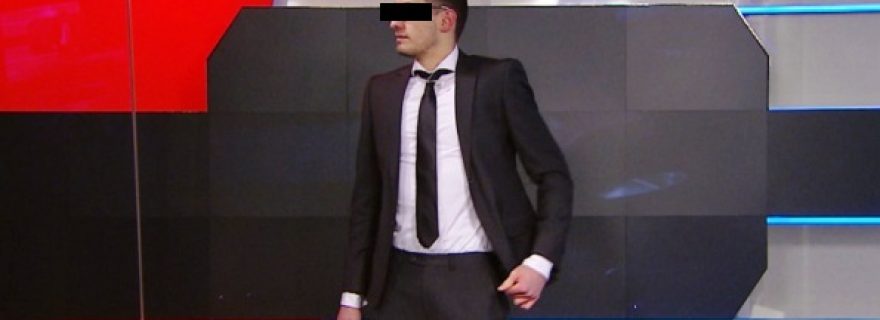One of us: Tarik Z. and Conspiracy Culture
Should we view Tarik Z., who tried to hold the Dutch national television news hostage, as a would-be terrorist? To me, he represents something more humdrum, ordinary, and closer to home: latter-day conspiracy thinking.
On January 29, a 19-year-old student was arrested after forcing himself into the television studio of the NOS, demanding airtime and causing the 8 o'clock news not to be broadcast for the first time in Dutch television history. Tarik Z., the son of an Egyptian man and Dutch woman, had a conversation with the security guard - without knowing that he was already on air - about his plans. The cultural pattern that emerges in Tarik’s conversation with the security guard (who kept admirably calm and talked to him like a human being) does not show an angry young migrant out to harm a society that refuses him recognition and access. On the contrary: it shows someone who has swallowed the conspiracy culture of modern capitalist societies hook, line and sinker.
The truth is out there
Tarik claimed that the broadcast time he demanded would disclose "major global issues”: “We’ve been hired, say, by intelligence services and have learned things from them that call current society into question. Now we’re going to bring those things into the open.” His message is that those in the know should not be misled by the normal appearance of our current society, as secret services are at work that can show that at a global level these phenomena are not what they seem.
It is the kind of attitude to human relationships expressed in the double slogan of The X-Files: “trust no one” and “the truth is out there” – a slogan that has been brilliantly analysed by anthropologists Kathleen Stewart and Susan Harding. They point out that the slogan perfectly characterizes the attitude towards government and society among American Evangelical Christians who are awaiting some kind of Apocalypse, but which was of course also widespread among the more or less secular Ufologists, occultists, and other lovers of SciFi among whom the concept of The X-Files originated.
Admittedly, most people do not identify with people who live in the expectation of a Christian or extraterrestrial Armageddon just around the corner. The X-Files is common culture, however, not because of its occult content, but because of the attitude towards social life it expresses: the attitude that, regardless of whether you believe in God, flying saucers, witches, or the evil intentions of the government, all public appearances (but especially the authorities) are to be mistrusted, and it is only a unique personal insight that allows you to see what is true.
The 'true self'
This cultural pattern is quite familiar to students of modern religion: ever since the reinvention of Western esotericism in the nineteenth century, there has been a widespread tendency to believe that we personally malfunction because we have been indoctrinated by the authorities of mainstream society and culture, and that the only way to really liberate ourselves from the oppression of society and culture is to discover our 'true self' – the refrain of the lingua franca of New Age, a secularized version of Christian gnosticism. For New Agers, their prototype bugbear was the idea of a Christian Church, and its insistence on demanding unquestioning faith and obedience from individual believers; but they equally mistrusted the voice of reason – that is, science and the bureaucratic state – for its lack of transparency and accessibility.
New Agers rarely question, however, the fact that what their 'true self' most resembles is a customer in a spiritual supermarket: the cultural persona who, as the advertising business has told its consumers since the late nineteenth century, will become unique by acquiring one of the mass-produced experiences it puts on show. Like blue jeans and cars, the New Agers’ true selves are off-the-peg consumer goods, tiredly broadcasting the conceit of uniqueness at the end of their assembly line. Tarik Z.’s promise to expose our society’s public truths as a sham is equally prefabricated and off-the-peg; his originality consists merely in the fact that he thought his message should replace the news at gunpoint (even if the gun was fake).
Privacy and uniqueness
The police officers who arrested him may at least be complimented on holding their fire (even if they did look a bit like bad actors playing a SWAT-team). No such compliment is due to the chief editor of the NOS Journaal, Marcel Gelauff, who showed no consideration for the privacy of a somewhat disturbed 19-year old in his eagerness to broadcast, in his own words “something unique in Dutch television history”. Bas Heijne is right when he identifies the combination of Gelauff’s hyperbolical claim to uniqueness and his neglect of the young man’s interests as a symptom of a “self-aggrandizing media culture” – a culture that, like advertising and New Age, seems to thrive more on mass-produced claims to uniqueness than on making responsible choices of its own. Correction: many New Age practitioners I have met are suspicious of capitalism, and, unlike most marketeers and some newsmakers, innocent of hyperbole or self-aggrandizement.
One more disarming detail: Tarik Z.’s letter to the public misspelled the “live” broadcast he demanded at gunpoint as 'lieve' – Dutch for “sweet” or “dear”. A Freudian slip that signals an intimacy that the NOS Journaal’s claim to uniqueness tries to deny?



0 Comments
Add a comment